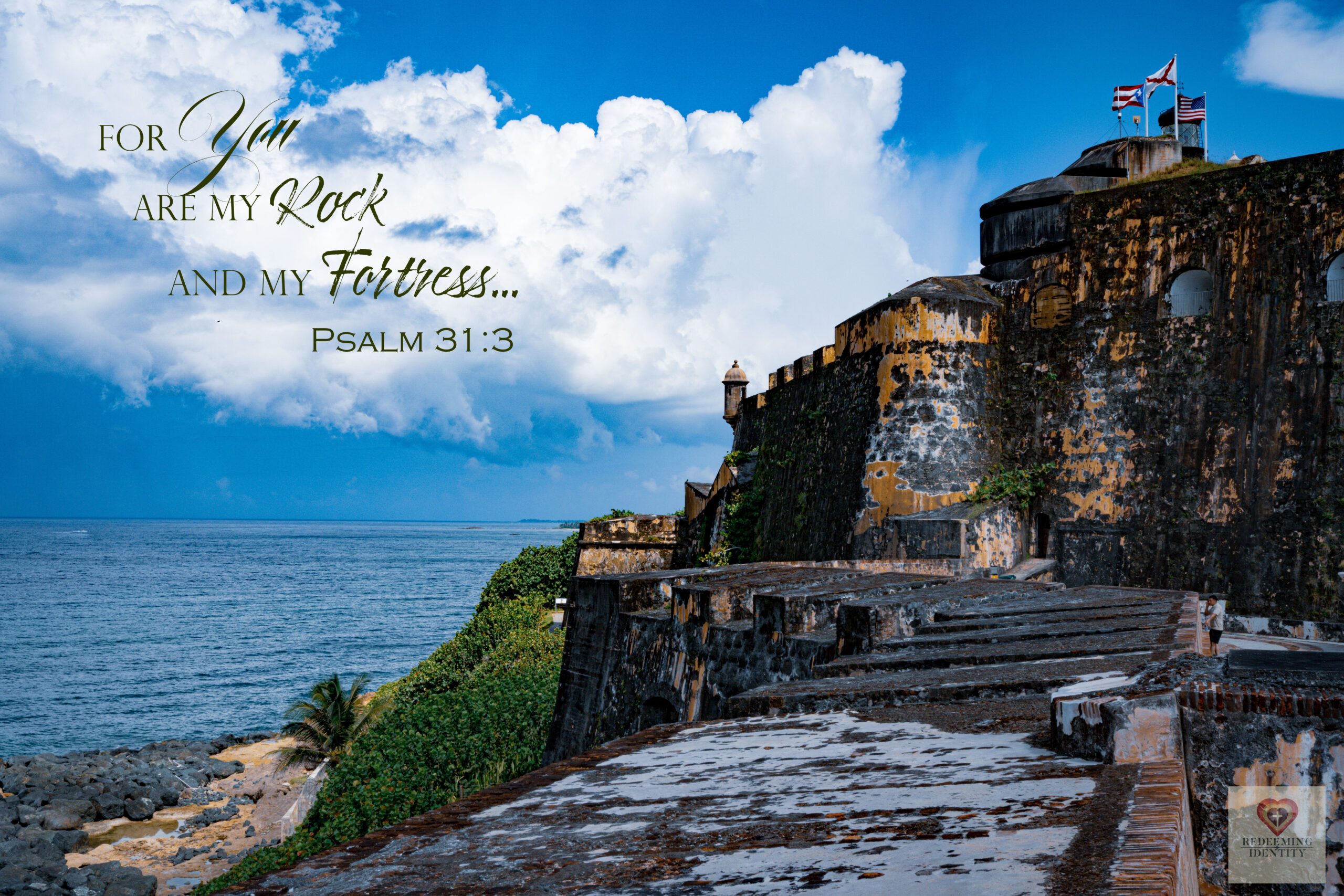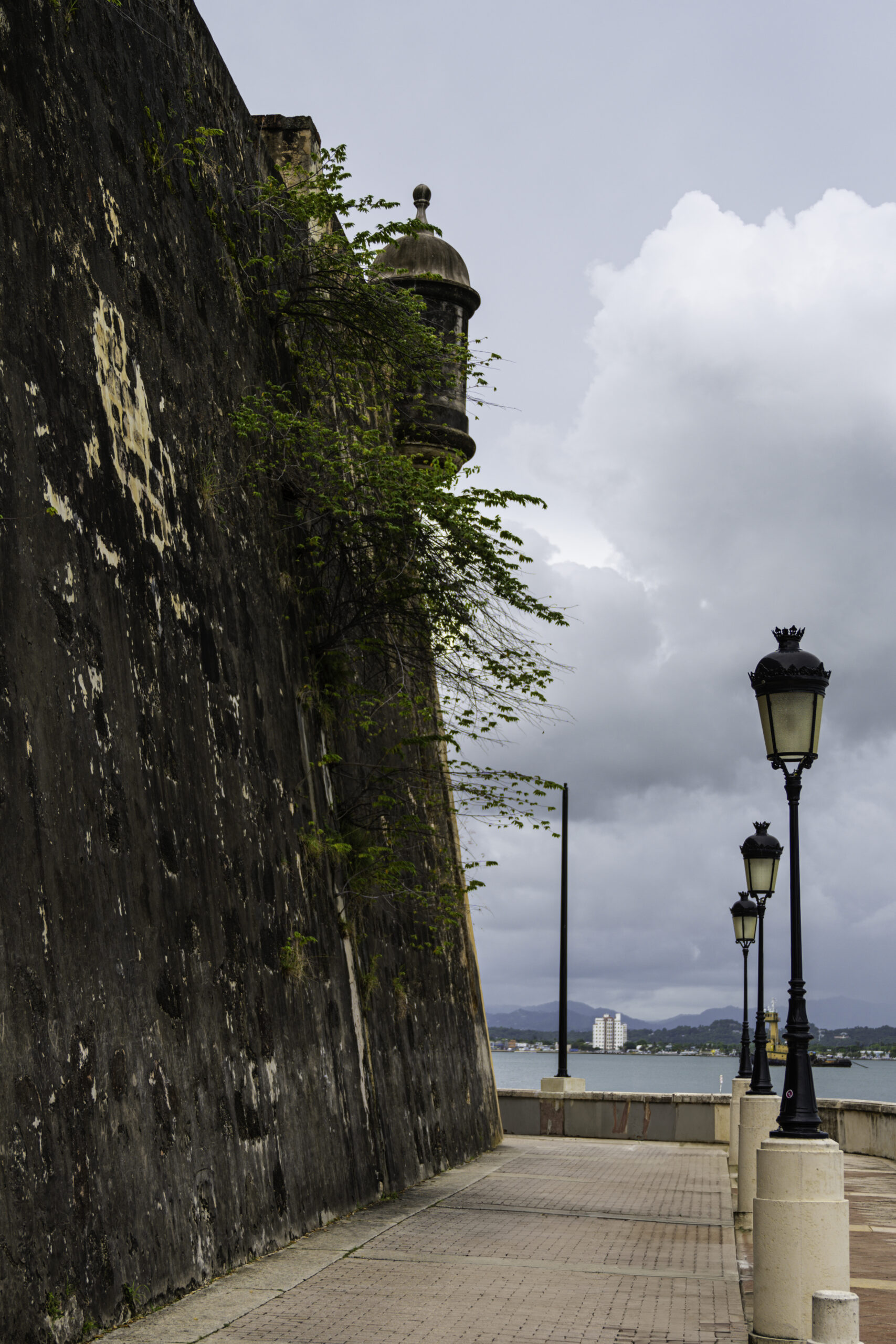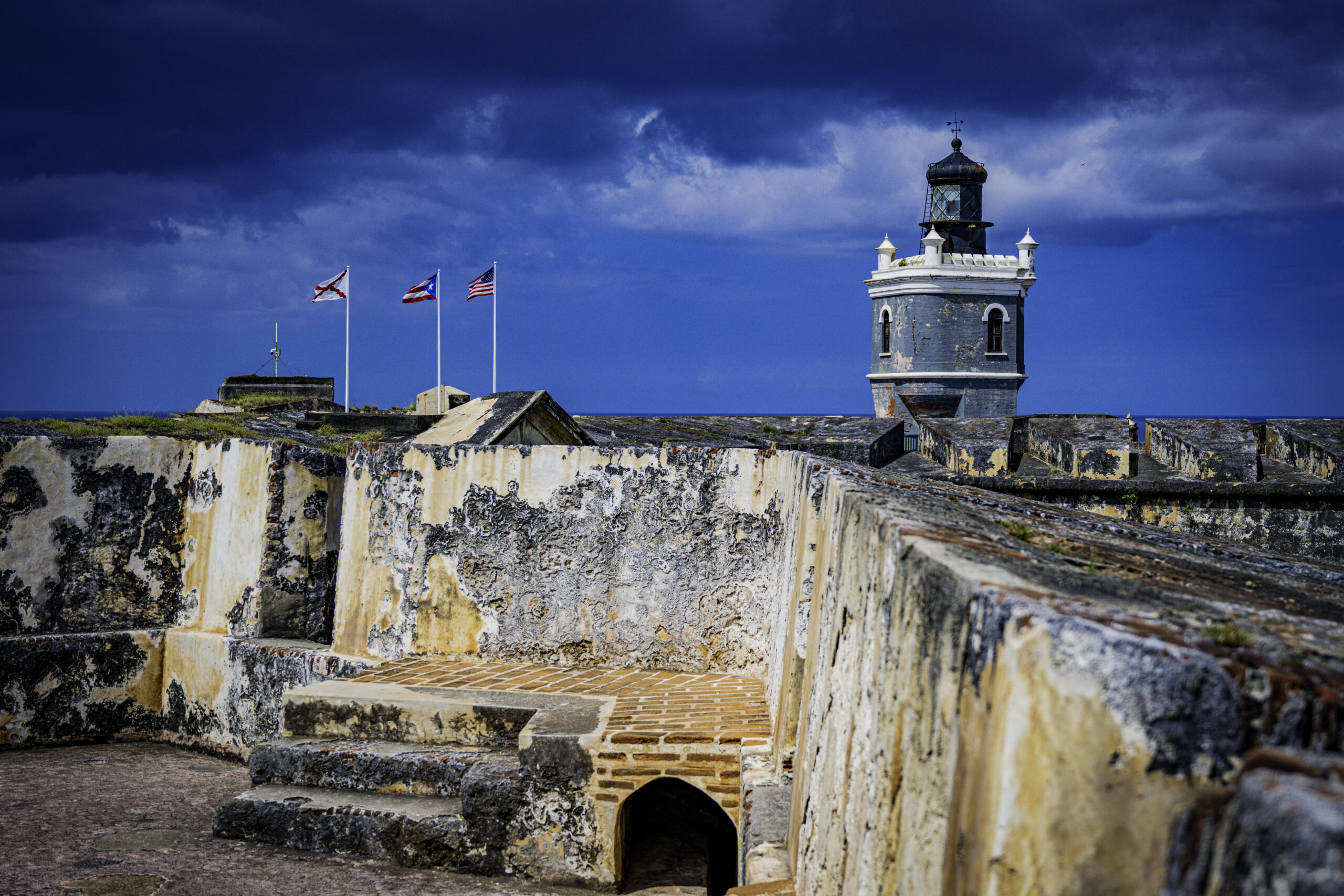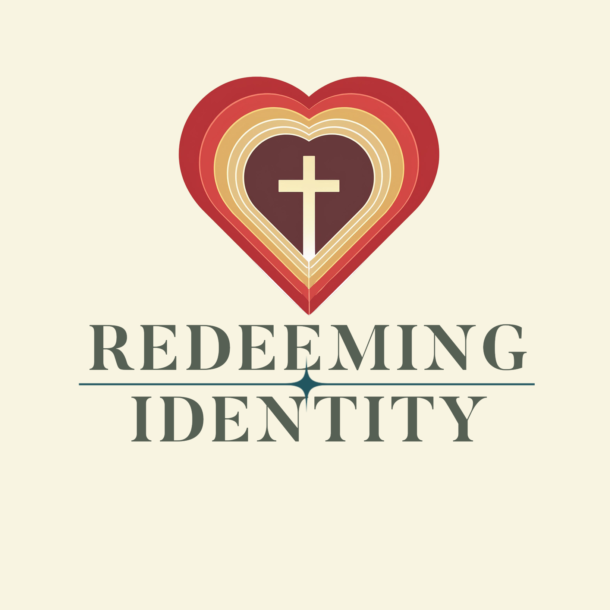
DIOS MI FORTALEZA
El Morro
When traveling to other countries, one site that visitors from the states want to experience are medieval castles or fortresses. Partially, this is because there are very few such massive stone structures in the states. We marvel when we see them, knowing that people hand built these huge strongholds over many years.
During a recent trip to the island of Puerto Rico, we had the opportunity to visit the Castillo San Felipe Del Morro, simply called El Morro. This fortress, which covers the northernmost point of the island, along with Murallas del Viejo San Juan, or the Walls of Old San Juan, comprises a defensive wall system built to protect the city and bay of San Juan. Much of this impressive structure, built during the 17th and 18th centuries, is still mostly standing today.
The fortress El Morro defended the island of Puerto Rico from attacks for almost half a millennium, because of the island’s strategic location at the entrance to the Caribbean. In 1797, briefly after the construction of the fortress was completed, the British tried to take over the island. General Sir Ralph Abercromby came to San Juan with 68 ships and 7,000 men to conquer Puerto Rico. During the attack, the people in the city retreated behind the impressive 40 foot tall and more than 20 foot thick walls of the fortress. From that protected location, the soldiers and residents of the city were safe during a 7-day artillery duel with the British fleet. The British finally retreated from San Juan, since they could not break through the defenses of the stronghold.
David’s Fortress
The experience of having to find protection in a fortress is something that is foreign to us. For people in previous times, the fortress was a place of safety when attacks came. Fortress engineers created high and thick walls to provide protection against attack from the outside. The people of San Juan put their trust in the fortress, El Morro, a place of security and safety when the enemy attacked.
David, the king of Israel, lived during a time when people were well aware of the importance of a fortress for their safety and security.
“In You, O LORD, do I take refuge;
let me never be put to shame;
in your righteousness deliver me!
Incline Your ear to me;
rescue me speedily!
Be a rock of refuge for me,
a strong fortress to save me!
For You are my rock and my fortress;
and for Your name’s sake You lead me and guide me;”
Psalm 31:1-3

When enemies came, the people retreated into the fortress, putting their trust in the ability of the fortress to withstand the attack. The fortress was a place of refuge during times of trouble.
The city of Jerusalem was the capital of Israel and the home of King David. Jerusalem was a walled fortress renowned for being very difficult to conquer. The city was built on top of a cluster of five hills, rising to an elevation over 2,500 feet, bordered on most sides by deep valleys, so it was difficult to approach. Just like San Juan, the wall surrounded the entire city, with towers built at strategic locations so it could be easily defended during an attack. This was an impressive fortress.
Regardless of how impressive a fortress Jerusalem was, with its natural defenses and high walls, David knew even it could be defeated. His men had taken over the city of Jerusalem from the Jebusites, so David could make it Israel’s capital. They had found a weakness in the city’s defenses which they used to get behind the walls. Although it was a powerful fortress, Jerusalem had been defeated once and it would be defeated in the future.
When David was in trouble, he did not put trust in the protection provided by walls and defenses of Jerusalem, but in God. God was David’s fortress. David starts this psalm with, “In You, O LORD, do I take refuge.” He may have lived inside a physical fortress, but David’s trust was not in safety the walls of Jerusalem provided. Instead, he was safe because of God.
He saw God as a rock and fortress, a place of safety. No matter the circumstance, David was placing his complete trust in God to protect and preserve him.
“But I trust in You, O LORD;
I say, ‘You are my God.’”
Psalm 31:14
![Psalm 3113–14 [widescreen]](https://redeemingidentity.com/wp-content/uploads/2024/10/Psalm-3113–14-widescreen.png)
Fortress Principles
When David used the term “my fortress” to describe God, he used the Hebrew word mesuda, which references a mountain stronghold. This description provides some beliefs or assumptions about fortresses that make them worthy of being trusted for safety during times of trouble. He is also implying that these same attributes of a stronghold are true about God, which makes him worthy of his trust.
When viewing fortress like El Morro, the adjectives that quickly come to mind are massive and strong. The sheer size of the walls of the fortress provides a defense from people getting inside during an attack. Additionally, the walls are constructed using robust materials like large stones, ensuring they have the strength to resist any external attacks trying to gain entrance. The strength and integrity of the fortress make it a place of safety for those inside.
For additional strength, the fortress was typically built on a rock foundation. The solid foundation made the structure more stable. Since the foundation could not be moved, the walls of the stronghold would be unshakeable. The fortress fixed in its position because it was anchored to a rock foundation.
A good fortress was reliable. It had been tested in battle, under attack previously, and was still standing. The battle in 1797 was not the first time that El Morro had been attacked. There were several other times that the British had attempted to take over Puerto Rico. El Morrow provided defense and protection during those previous attacks. It had proven that it could be relied upon when the attacks came.
Finally, a fortress can only be trusted to provide protection when the people know that it is available during times of trouble. If people came to the fortress when an attack was coming and the gate to the fortress was closed, it would not provide any protection. For a fortress to provide protection, the Lord of the fortress needs to allow the people in, to be kept safe under the protection of his fortress.
People trust in a fortress during times of trouble because it has demonstrated the attributes of a good fortress: strength, stability, reliability and availability.
When we see God as a fortress, we are recognizing that He is the model for all of these attributes. He can be trusted to keep us safe, because He is strong. He is stable and unmovable. He is reliable. He is always there when needed.

A Fortress Perspective
We are brought up in a culture that values independence and self-reliance, teaching us to not trust in anyone else. As disciples of God, we are choosing to adopt a new principle that God is worthy of our trust. This is a fundamental change in our beliefs. Instead of standing alone on the outside of God’s kingdom, we are willingly entering into God’s fortress.
“Who shall separate us from the love of Christ? Shall tribulation, or distress, or persecution, or famine, or nakedness, or danger, or sword? … No, in all these things we are more than conquerors through Him who loved us. For I am sure that neither death nor life, nor angels nor rulers, nor things present nor things to come, nor powers, nor height nor depth, nor anything else in all creation, will be able to separate us from the love of God in Christ Jesus our Lord.” Romans 8:35, 37-39
When we put our trust in God, we are trusting in who He is, everything that makes Him our fortress and more. We are no longer separated from Him, on the outside, but we are now in Him. We now have a fortress perspective.
God is our fortress, and we are in Him. With this new perspective, we no longer view and interpret the world as if we are standing alone and with our own strength. We are standing safely in God’s fortress, under His protection. There is nothing that God cannot handle, so regardless of the circumstance, we are “more than conquers.” Notice that it does not say we “can” be conquers, but that we “are” more than conquers. This is because it is not dependent on us, but on our fortress, God, to provide the victory.
God, as our fortress, is worthy of our trust, regardless of the circumstances we may encounter. Knowing that there is nothing that can come against us that is bigger or stronger than God changes our perspective. We cannot be the same. The trials and difficulties that we experience, which previously seemed so large and unsurmountable, are seen from the point-of-view with the all-powerful God of all creation on our side. We have nothing to fear, as long as we are in God, trusting in Him as our fortress.
Our fortress perspective is not that we hoping for victory, but that victory has already been obtained. We are allowing God to transform us so we can experience and live out of the new identity that comes from that victory.
![Romans 831 [widescreen]](https://redeemingidentity.com/wp-content/uploads/2024/10/Romans-831-widescreen.png)
He Is So I Can Be
How does a resident of a fortress demonstrate their trust in the strength and faithfulness of the fortress? They live with confidence as part of the kingdom, that they are safe within the fortress.
We need a fortress to protect us from the attacks that consistently come against us. The world calling us to live by their perspective. Spiritual enemies tempting us to believe that we don’t need God. Our own previous corrupted identity leading us to our old way of thinking, feeling, and doing.
God’s desire for us is that we become who He has created us to be. As we learn more about who God is, we will trust in Him. It is only then that we will discover we should be and live into that with confidence.
God is a fortress, so I can be without fear.
The psalm ends with the challenge to “Be strong, and let your heart take courage, all you who wait for the LORD!” (Psalm 31:24) Since we are in God, we are called to grasp hold of and strengthen the identity (heart) that God is creating within us. There are people and circumstances that would try to keep us from becoming who God desires. We do not need to fear or succumb to these outside forces, because we are safe in God. We can be who God created us to be, without fear of what others may think or how they may react towards God’s transformation in us.
As we become who God has called us to be, we can, with boldness, do what He has called us to do. Our purpose is now to know God, becoming who He designed me to be, doing what he created me to do.
God is my fortress, so I can be at peace.
“You keep him in perfect peace
whose mind is stayed on You,
because he trusts You.” Isaiah 26:3
The concept of peace (Shalom) in the Bible is not the absence of conflict, but of contentment in being whole because of God’s presence and work in our life. This is what we are called to be, at peace, because God is with us, which is enough, and He is making us who we were always meant to be.
Unlike the ancient fortresses, we do not only enter the fortress when there is trouble. We are now always and everywhere in God. No matter where we are or what we are doing, we take God our fortress with us. The world is always around us, trying to have us be different that what God is calling us to. We can be at peace, regardless of our circumstances, because God, our fortress is always with us.
Your Response
If you would like to know more about receiving the gift of peace that God offers you, please take some time to hear about God’s Good News.

Time for Reflection
Read Psalm 31.
What additional principles or beliefs about God come from seeing him as our fortress.
How does believing and trusting in God as your fortress change your perspective, how you view and interpret your circumstances?
A classic hymn that reminds us that God is our fortress is A Mighty Fortress is Our God. Use the following link to spend some time worshiping God for being your fortress.
A Mighty Fortress is Our God (Performed by Worship Initiative)
Spend some time praying and thanking God for being our fortress.
Pass it on!
If God has used this article to encourage or challenge you, please take some time to share it with others by sharing it on your facebook or other social media site. Also, please let us know how we can continue to help you discover who God is and who He created to you be.



0 Comments